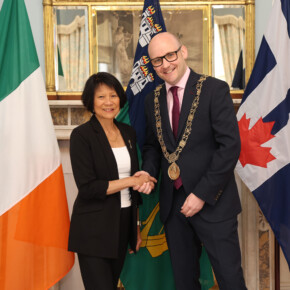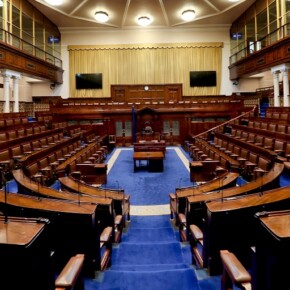Referendums scheduled for next March
Mike Finnerty 05 Dec 2023
Two referendums will be held on March 8th of next year.
Voters will be asked if they want to amend the constitutional text in Article 41 (The Family) and Article 41.2 (Duties of the Mother).
The proposed referendums, should they pass, would broaden the definition of family beyond the current language surrounding marriage in the Constitution.
Voters will be also asked if they want to add new text that recognises all those who provide care and to remove the reference to women’s duties in the home from the Constitution.
Announcing the referendums, An Taoiseach Leo Varadkar said “our constitution will continue its history protecting both the family and the institution of marriage.”
“Repurposing the wording, however, acknowledges the families may also be founded on lasting relationships other than marriage.”
“For example, a family headed by a lone parent, or a family headed by a grandparent or guardian all of us know people who are committed to each other in a loving relationship over a sustained period of time, who are not married.”
Minister for Integration Roderic O’Gorman said that “a woman’s place is wherever she wants it to be”.
“After decades of deliberation, we are finally offering the people the opportunity to remove the archaic and sexist reference to women in the home, which has contributed nothing to the good of women’s lives in this country other than to limit their choices.”
“While this updating of our Constitution is essential, it is also important that we don’t lose sight of the vital role that care and caring relationships play in knitting together the fabric of our society. It is long past time that we recognise the invaluable contribution that caring – the quiet dedication of so many family members around Ireland – provides to this country.”
Minister for Education Norma Foley said “the wonderful carers in our homes include both men and women. There are families where it is the dad who stays at home and the mum works outside the home, families where one parent juggles children in childcare to part-time employments, it can be tiring and relentless work.”
“The men and women of Easter 1916 pledged to cherish all of the children of the nation equally, and as Government, we want to continue with that.”
The 39th Amendment, which deals with the definition of family, proposes to amend Article 41.1.1 to insert the words “whether founded on marriage or on other durable relationships”.
It proposes the deletion of the words “on which the Family is founded” from Article 41.3.1.
The 40th Amendment deals with the role of women in the home.
It proposes to delete Article 41.2 and replace it with Article 42B which reads “the State recognises that the provision of care, by members of a family to one another by reason of the bonds that exist among them, gives to Society a support without which the common good cannot be achieved, and shall strive to support such provision.’
News of the referendums has been cautiously welcomed in the political world.
Labour Party leader Ivana Bacik welcomed progress on recommendations to replace “sexist language around women and mothers” in the Constitution but said that there was an element of disappointment surrounding what exactly will appear on the ballot paper.
Citing her past as the former chairperson of the Committee on Gender Equality, she questioned why language that recognises care both in the home and the wider community was not included.
She questioned why the “more restrictive” definition of care was used, and cited an example of care provided by a friend, or people providing it on a charity or paid basis.
“For example, HomeHelps, or people employed by the HSE, provide extensive, vital levels of care, without which our society cannot function.
“It is disappointing to see that kind of care is not going to be recognised within the Constitution,” she told RTÉ.
The National Women’s Council had a mixed response to the referendum announcement.
Orla O’Connor, director of the National Women’s Council said “while we would have liked to see the broader wording on care as suggested by the joint Oireachtas committee on gender equality included in our Constitution, we believe the proposed wording will be an important opportunity to value care within families.”
“Recognising family care in the Constitution is important, and it must also lead to practical supports that families need.”
She said that the organisation will consult with almost 200 member groups on the proposed wording by the Government and decide on how the organisation will conduct itself during the referendum campaign.
The spectre of “disinformation” was raised by the Taoiseach, and pledged that Government would fight any attempts to muddy the waters during the campaign.
“It is crucial that we listen carefully to people in groups who may oppose these proposals and give them a fair hearing,” he said.
“We’re all aware that it’s far too easy for debate to become polarised, and the only way to avoid this is to participate in an informed, respectful conversation with everyone concerned.”
Indeed, the referendum was proposed to be held in November but was subsequently postponed as members of Government expressed concern that there was not enough information surrounding the referendum and what exactly people would be voting for.
Referendums in Ireland are traditionally held concurrent with local, European or general elections, although recent referendums such as the same-sex marriage referendum and the 8th amendment referendum were held on non-election days and saw a turnout of over 60% in both instances
The last referendum to be held in Ireland took place in 2019 when 82% of voters backed an amendment that removed the requirement for a period of separation before proceedings for divorce could be initiated as well as recognising foreign divorces.











